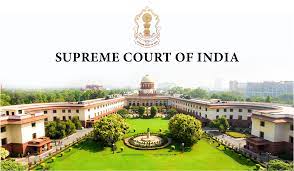In order to ensure a fair and transparent investigation in cases involving the Directorate of Enforcement (ED) and the officials of a State Government, the Supreme Court on Thursday proposed evolving a pan-India mechanism on the matter.
The Bench of Justice Surya Kant and Justice KV Viswanathan noted that while it was important that offenders did not go scot-free, vindictive arrests and mala-fide witch-hunting should be avoided at all costs.
The Apex Court came forward with the idea of guidelines while dealing with a writ petition filed by the national agency seeking to transfer the investigation of the bribery case against ED officer Ankit Tiwari from the Tamil Nadu Directorate of Vigilance and Anti-Corruption to the Central Bureau of Investigation (CBI).
While issuing notice to the State of Tamil Nadu, the Bench posted the matter for further hearing after two weeks.
It clearly instructed the TNDVAC not to proceed with the investigation against Tiwari for the time being and share with the Court all materials collected so far in the case by them.
ED was represented by Solicitor General of India Tushar Mehta, who clarified that the agency was not supporting the officer but looked forward to a fair and proper investigation into the matter.
The SG complained that the Tamil Nadu Police was not sharing the FIRs of the scheduled offences, thereby stalling the ED investigation in money laundering cases against many State officials.
The SG submitted that the State agency, under the guise of investigating the case against Tiwari, raided the ED office and seized several unconnected files, which are relevant in cases against many Ministers, who are under the ED’s scanner. Senior Advocate Kapil Sibal, appearing for the State, denied these allegations.
At this juncture, the bench said that it is seeking to address a “larger issue in the matter”.
“The larger issue of best practices, considering the federal nature of the country… we will evolve a mechanism. You should sit together and give suggestions,” Justice Viswanathan told both the lawyers. While agreeing with the judge, Sibal said that the “federal structure of the country is being jeopardised”.
Justice Surya Kant, referring to an order passed by the Madras High Court rejecting CBI probe in the case against Tiwari, said, “The way the PIL was filed, the way the High Court entertained it and passed the order, we don’t want to comment on it now. But there is something which can be said about both sides. Better you come up with solutions, otherwise we will find out. The matter needs to be probed in a transparent manner”.
When Sibal alleged that the ED was targeting only “certain states”, SG objected by saying that political statements are being made.
Justice Viswanathan then explained what the Court had in mind: “There may be genuine cases where ED may have to go in, there may be cases where they are brought into mala fide. Some kind of best practices we want. There has to be a mechanism where when a central agency…particularly when the ruling party is different between the Centre and the State. Something has to be evolved so that while genuine cases don’t go scot-free merely because it is being handled by the central agency, at the same time there is no mala fide witch-hunting.”
The Solicitor General, while expressing agreement with the bench on the need for such a mechanism, raised a grievance that the TN Police was not sharing the FIRs of scheduled offences. The SG submitted that the Tamil Nadu police’s website relating to FIRs was blocked under the orders of the competent authority and said that the judges themselves could check this fact. When Sibal retorted by asking if the ED has asked for FIRs in any other State, Justice Kant asked him : “Mr.Sibal, aren’t the FIRs supposed to be uploaded on the website? Why the secrecy?”.
“If you have registered an FIR against a public servant for corruption or illegal mining or disproportionate assets, what is the State propriety to say that we will not permit further investigation by the ED?”, Justice Kant asked.


